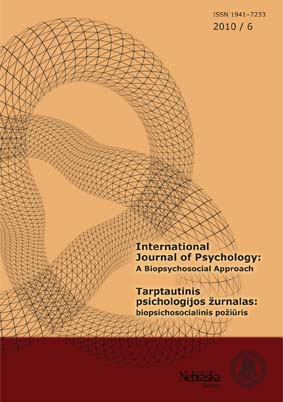Moterų agresijos ir tėvo komplekso sąsajos
Relationship Between Female Aggression and Father Complex
Author(s): Gražina Gudaitė, Juliana LozovskaSubject(s): Psychology
Published by: Vytauto Didžiojo Universitetas
Keywords: moterų agresija; agresyvumas; tėvo kompleksas; vaikystės patirtys; female aggression; aggressiveness; father complex; childhood experiences
Summary/Abstract: Atsižvelgiant į moterų agresijos problemos aktualumą ir nepakankamai ištirtą temą, šiame darbe keliamas tikslas – atskleisti moterų agresijos ir tėvo komplekso sąsajų prielaidas. Tyrimu buvo siekiama nustatyti vyraujantį tėvo kompleksą bei jo savybes, atskleisti tėvo komplekso raišką dabartiniame moterų gyvenime, galiausiai plėtoti komplekso ir agresijos sąsajų sampratą. Tyrime naudota pusiau struktūrinantis pokalbis bei projekcinės piešimo metodikos (H-T-P ir piktogramų metodikos), leidusios atskleisti tiek sąmoningą moterų požiūrį į agresiją, tiek pasąmonines šio elgesio prielaidas. Tiriamisios. Tyrime dalyvavo 20 moterų, už įvairius nusikaltimus atliekančių bausmę Panevėžio pataisos namuose. Remiantis tyrimo rezultatais, galima kelti prielaidas, kad agresyvus moterų elgesys yra susijęs ne su dideliu vidiniu agresyvumu, o veikiau su atsaku į nepatenkintus poreikius, gynyba, kraštutiniu bandymu apsaugoti savo ribas. Analizuojant gelmines šio elgesio prielaidas, paaiškėjo, kad dauguma tyrime dalyvavusių moterų susitapatina su neigiamu tėvo kompleksu, susiformavusiu itin traumuojančiomis vaikystės patirties sąlygomis. Background and Purpose. The problem of female aggression is becoming more relevant due to the growing numbers of female offenders, and lack of current research being conducted. The aim of this paper is to unfold the relationship between female aggression and the father complex. The goal was to identify dominant father complex problems and their features, to reveal manifestations of the father complex in everyday life. Method. To reach this aim, in-depth interviews, projective pictogram methods, and the H-T-P method were applied to a population of women incarcerated in Panevezys penitentiary. These methods enabled us not just to understand women‘s conscious position and attitude towards aggression, but also to capture an unconscious background of the aggressive behaviour. Results. According to the data, female aggressive behaviour is not linked to high levels of inner aggressiveness, but rather in response to unmet childhood needs. Aggressive behaviour can be understood in terms of defensive reactions, and extreme attempts to defend personal space. By analyzing in-depth assumptions of aggressive behaviour, it was determined, that the majority of inquired women identified with the father complex, which was developed under very traumatizing childhood conditions. Identification with the father complex results in significant impact on the problems of interpersonal relationships, emotional immaturity, infantile defensive mechanisms, weak Ego, inadequate self-image, and gender and sexual identity problems, which are prevalent in the inquired population.
Journal: Tarptautinis psichologijos žurnalas: biopsichosocialinis požiūris
- Issue Year: 2010
- Issue No: 6
- Page Range: 99-120
- Page Count: 22
- Language: Lithuanian

